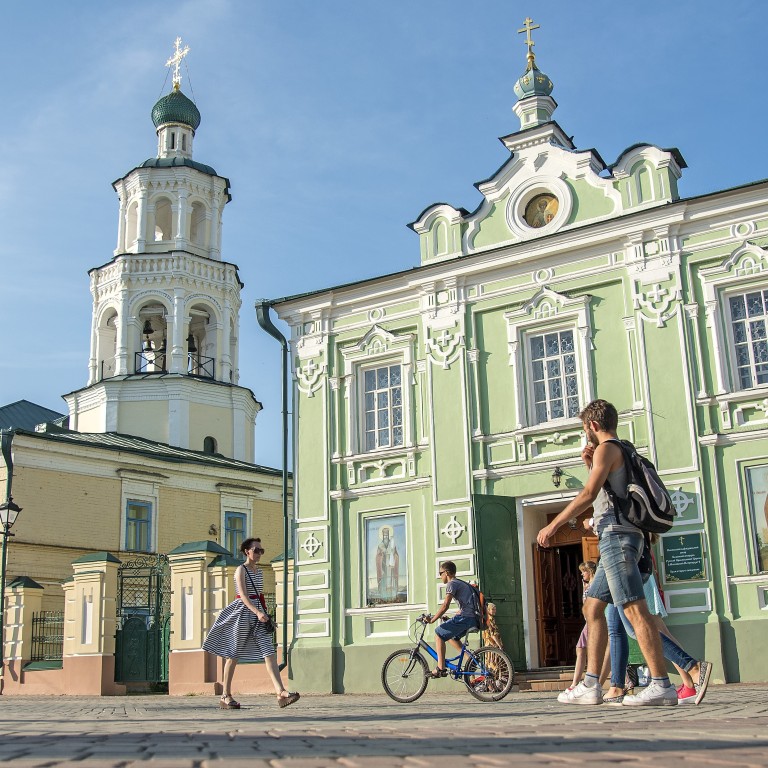
Road to Moscow to could open route to riches for more Chinese firms in Russia
- A US$760 million deal to build a section of Russia’s flagship highway programme could pave the way for more contracts
- Chinese investment in its neighbour’s infrastructure has been minimal until now
China and Russia send pointed message to Washington on war anniversary
The contract was signed ahead of a meeting on September 29 of the Intergovernmental Commission for Cooperation of Northeast China and the Far East and Baikal Region of Russia. The meeting will be co-chaired by Vice-Premier Hu Chunhua and his Russian counterpart Yury Trutnev.
The Moscow-Kazan highway is part of the so-called Western Europe-Western China road corridor, stretching more than 8,000km from the coastal Chinese city of Lianyungang on the Yellow Sea through Kazakhstan and eventually to Russia’s most westward city St Petersburg.
CRCCI, a subsidiary of state-owned China Railway Construction Corporation (CRCC), will survey, design and construct the 107km fifth section of the road linking the capital of Russia’s semi-autonomous Republic of Tatarstan in the southwest with Moscow.
The highway is expected to be completed in 2024 and will cut travelling time between the two cities almost in half – from 12 hours to 6 hours and 30 minutes.
Full details of the deal were not released, but Meng Tao, a general manager with CRCCI’s Eurasia branch, told Xinhua the contract included all related facilities, including toll and petrol stations.
Could Russia side with the US and India against China?
The highway is seen by Moscow as a key plank in its effort to boost local economies. In July, newly-appointed Prime Minister Mikhail Mishustin described it as “an essential part of the national plan of action to mitigate the consequences of the coronavirus outbreak and to support key sectors of the economy”.
Mishutin said the project would give the regions an impetus for accelerated development, putting the expected aggregate growth of gross regional product in excess of 500 billion roubles (US$6.5 billion) by 2050.
Regional observers said the deal could be seen as an effort to cement economic ties at a time when both countries were under growing pressure from the West.
Can China maintain construction boom to help virus-hit economy?
A jointly funded US$22 billion high-speed railway between Kazan and Moscow was agreed in 2013 but there has been little sign of progress after the announcement met with strong opposition over its price tag.
“The cost for highways is much lower than high-speed railway and it could also help the two sides boost bilateral ties and achieve the goal of US$100 billion [in trade] this year under the pandemic,” said Li Lifan, a Russian affairs expert with Shanghai Academy of Social Sciences.
Artyom Lukin, an associate professor with Russia’s Far Eastern Federal University, noted that CRRCI was the only foreign construction company to win a contract.
“It could be intended as a trial run,” he said. “If it goes well, Chinese companies could be getting more contracts in Russia’s road construction and other big infrastructure projects. Chinese companies such as CRCC are among the world’s leaders in realising huge infrastructure projects. By awarding a contract to CRCC, the Russian government may be seeking to learn from Chinese expertise.”
Under President Xi Jinping’s flagship Belt and Road Initiative, China has in recent years embarked on an ambitious investment and construction programme of roads, ports, bridges and railways linking to Asia, Europe and beyond.
In contrast, Chinese investment in Russian infrastructure has been relatively quiet and mostly in the energy sector, despite their shared interest in improving links across the Eurasian supercontinent.
According to Lukin, this is partly because local governments, while desperate for investment, preferred Russian companies over Chinese contractors. But, he said, some compromises appeared to have been made.
“If China starts to massively invest in Russian infrastructure, some contracts have to be given to Chinese companies but a significant portion should go to Russian contractors too,” Lukin said.
“The decision to involve CRCC in the construction of the Moscow-Kazan expressway may be a sign that Moscow and Beijing are groping for a compromise solution that could finally bring much-needed Chinese investment into Russia’s infrastructure.”

